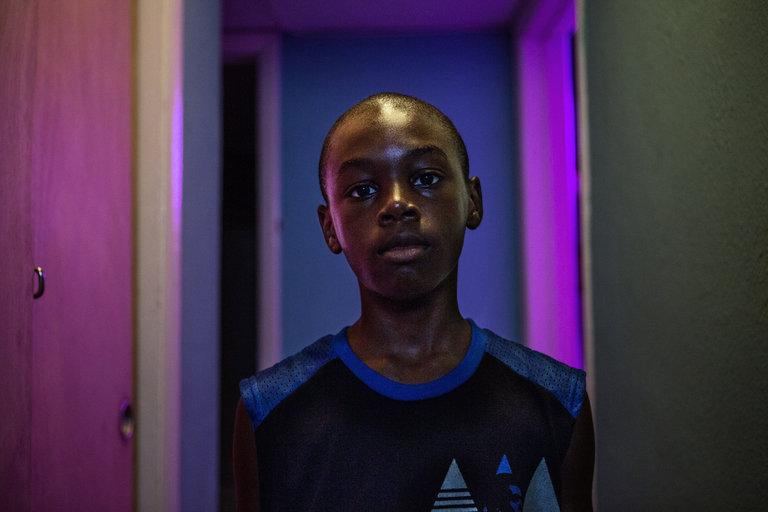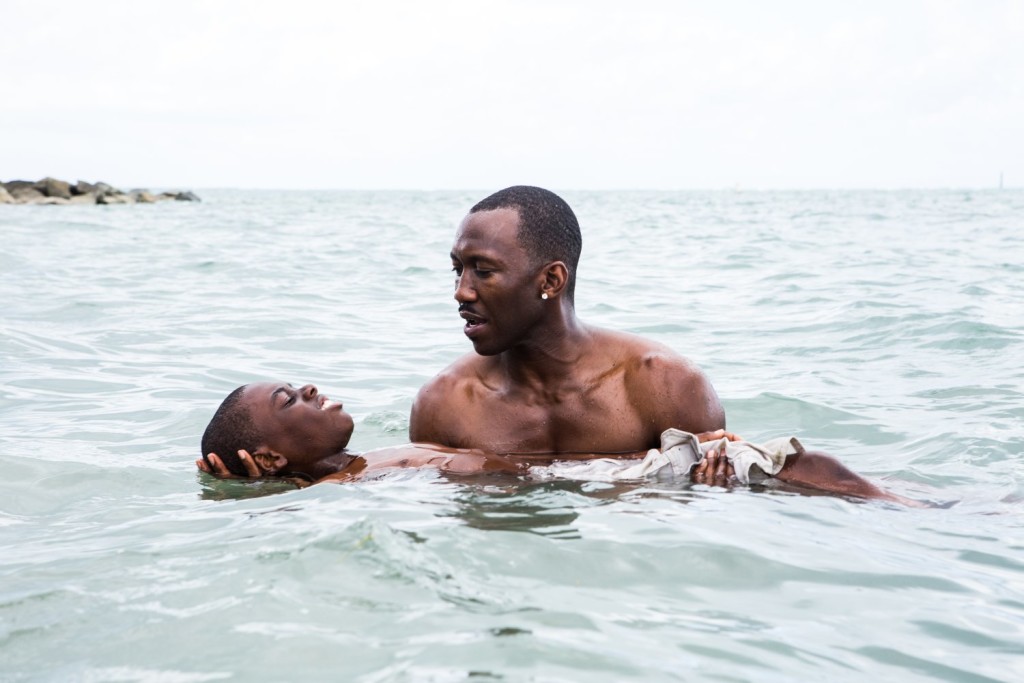“MOONLIGHT”
IS AN ESSENTIAL
WORK OF ART
FOR THE CURRENT
POLITICAL MOMENT
by Nijla Mu’min
“I cry so much, sometimes I feel like I’m gonna turn into drops,” says lead character Chiron in a scene from the film Moonlight. Though he is referring to his personal experiences, this line resonates with the way many people are feeling in this country.
Moonlight, written and directed by Barry Jenkins based on a story by playwright Tarell Alvin McCraney, may be one of the most important artistic responses to our current political moment. The film, which just swept the Gotham Awards, works in subtle ways to unpack characters who might otherwise be relegated to one-note stereotypes both in other films and in our mainstream national discourse. In doing so, Moonlight displays the kind of empathy and humanity that we desperately need right now.
Told in three chapters, with three actors playing the lead character at different points in his life, the film follows a young man, Chiron, trying to make sense of his sexuality while growing up in inner city Miami, a place textured by palm trees, rolling tides, and sleek low-riders. He is bullied by the other boys for not being “hard” enough, and finds little solace at home, where his mother Paula (Naomie Harris) falls into a deepening drug addiction.
In a pivotal early scene, Juan (a stellar Mahershala Ali), a neighborhood drug dealer, teaches young Chiron (Alex Hibbert) how to swim. Water envelops the lens and the two men transcend time and space. They are free, floating in a body of water. This, in Jenkins’ words, is a baptism. A washing, a renewal. The addition of Nicholas Britell’s haunting score brings a level of emotional depth that is only matched by the expansiveness of the ocean and the historical significance it has to the Black experience in America.
In another scene, a troubled Juan confronts Paula as she gets high in car near the area where they are selling drugs. Their confrontation reveals the dilemma and hurt that both share as caretakers of a boy whose life depends on their choices. Later, young Chiron confronts Juan candidly about those very choices. Seeing Black men talk, laugh, and cry is not new to me, but in the context of the current moment, where white supremacists eagerly salute Trump as if he’s Hitler, it is important and urgent to see Black humanity. It is important to see a little Black boy riding in the passenger seat of a low-rider with his arm out of the window because it has the power to connect us with innocence and transcend our daily division. Watching Chiron learn to swim and Juan attempt to shelter him from the brutality that awaits, is as beautiful as it is heartbreaking. We cherish the love that Juan gives Chiron, even as we question the life he’s chosen. This kind of conflict and nuance underscores the film.
Jenkins and cinematographer James Laxton find ways to integrate this conflict into the visual design of the film. Miami, a city often associated with vacation get-aways, becomes a beautiful nightmare. Bordered by the ocean, which represents freedom, Chiron is trapped inside his own body, aching to emerge. As a young boy Chiron peers across an apartment hallway saturated in magenta light, his mother far out of reach. Later, a teenage Chiron (Ashton Sanders), sits on the beach with his friend Kevin, the moonlight tracing their faces as the sound of waves crash against the shore, and sand sticks to their fingers. These images are at once sensual and tragic. Kevin truly sees Chiron, under the moon, against the water, but in other spaces, Chiron’s existence is questioned.
When we meet adult Chiron (Trevante Rhodes) in the latter portion of the film, he’s buffer, with a gold grill, riding in a car similar to the one Juan drove. His muscular body serves as armor, his eyes pulsing with the same gaze as his younger self. The magnetic energy between him and an adult Kevin (Andre Holland) that radiated from the screen and filled my body with warmth. The shy smiles and stolen glances that these two men share remind us what it feels like to truly reconnect with someone. Their ride home, like young Chiron’s ride with Juan in the beginning of the film, is a breath of fresh air.
And yet, when I read about whether Moonlight can play well outside of an urban or arthouse audience, I feel like an essential point is being missed. This is not a film that can be easily categorized and labeled. It is undoubtedly a Black film, but it’s not only for Black people or for gay people. This is a film about a person wanting to be free, and to be seen, despite the danger it entails. So many people endure this battle every day. It can be lonely, and transformative. Barry Jenkins and Tarrell Alvin McCraney have made a very human film during a very scary time. This is the purpose of art. This is healing.
+++++++++++
NIJLA MU’MIN Nijla is a writer, filmmaker, and essayist whose work can be found at www.nijlamumin.com.
BY NIJLA MU’MIN
Nijla is a writer, filmmaker, and essayist whose work can be found at www.nijlamumin.com.





Very balanced analysis of an important film. Thank you.
Captures the spirit, conflicted mood and ultimate triumph of Barry Jenkins’s “Moonlight”. A lovely read of a stunning work of cinema!